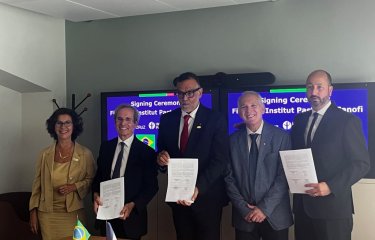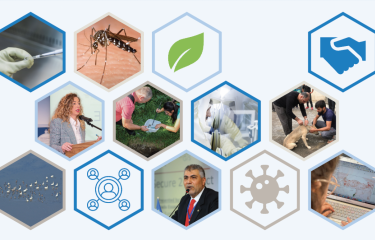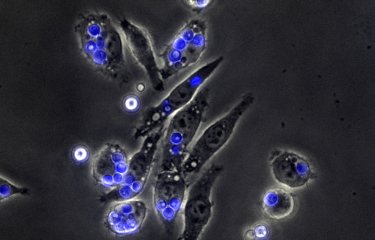For many years, microbiota – all the microorganisms that colonize a host - has been the subject of intensive research in many multicellular organisms. The mosquito Aedes aegypti vector of pathogens responsible for diseases such as dengue or yellow fever, is no exception to this rule. Recent scientific work has shown that the bacteria colonizing the mosquitoe’s digestive tract play a role in their vectorial capacity – their ability to transmit viruses notably to humans.
The 5-year group "Virus-Insect Interactions" led by Louis Lambrechts at the Institut Pasteur strives to understand the genetic basis of this vectorial capacity and to identify the genes potentially involved. But how can we be certain that the differences observed between two populations of Aedes aegypti are of genetic origin and do not come from differences between their microbiota?
To answer this question, the team of Louis Lambrechts collected, thanks to the collaboration of partners in different parts of the world1 in particular the Institut Pasteur de la Guyane, Institut Pasteur de la Guadeloupe and du Cambodge, genetically differentiated populations of Aedes aegypti mosquitoes . Bred under the same laboratory conditions, these mosquitoes harbour an identical gut bacterial microbiota. These results, published in the journal Parasites & Vectors, thus support the idea that differences in vector capacities observed in the laboratory between two mosquito colonies are of genetic origin since the microbiota is equal. « Maintaining mosquitoes under common laboratory conditions homogenized their bacterial microbiota. This indicates that in the mosquito the gut microbiota is actually determined by the environment and not by genetics. This is an important result for us because different strains of mosquitoes can be directly compared without fear of a microbiota confounding effect » explained Louis Lambrechts. On the other hand, this suggests that reference strains used in different laboratories around the world probably do not have the same microbiota, which could contribute to disparities in scientific results. It also implies that it is necessary to study mosquitoes directly in their natural environment to accurately assess their ability to transmit viruses.
As with many other multicellular organisms, the microbiota of mosquitoes is the subject of much research. The development of targeted interventions that would impair this microbiota could respresent an interesting weapon for preventing or disrupting the transmission of vector-borne pathogens.
1. Australia, Cambodia, Gabon, Guadeloupe, French Guiana, Uganda
Source:
Diverse laboratory colonies of Aedes aegypti harbor the same adult midgut bacterial microbiome. Parasites and Vectors. 27 March 2018
Dickson LB1, Ghozlane A2,3, Volant S2, Bouchier C3, Ma L3, Vega-Rúa A4, Dusfour I5, Jiolle D6,7, Paupy C6,7, Mayanja MN8, Kohl A9, Lutwama JJ8, Duong V10, Lambrechts L11
1 Insect-Virus Interactions Group, Department of Genomes and Genetics, Institut Pasteur, CNRS UMR 2000, Paris, France. 2 Bioinformatics and Biostatistics Hub, C3BI, USR 3756 CNRS, Institut Pasteur, Paris, France. 3 Genomics Facility - Biomics Pole, CITECH, Institut Pasteur, Paris, France. 4 Laboratory of Medical Entomology, Environment and Health Unit, Institut Pasteur de la Guadeloupe, Guadeloupe, France. 5 Vector Control and Adaptation, Institut Pasteur de la Guyane, Vectopole Amazonien Emile Abonnenc, Cayenne, French Guiana. 6 MIVEGEC, IRD, CNRS, University of Montpellier, Montpellier, France. 7 Centre International de Recherches Médicales de Franceville, Franceville, Gabon. 8 Department of Arbovirology, Uganda Virus Research Institute, Entebbe, Uganda. 9 MRC-University of Glasgow Centre for Virus Research, Glasgow, UK. 10 Virology Unit, Institut Pasteur in Cambodia, Phnom Penh, Cambodia. 11 Insect-Virus Interactions Group, Department of Genomes and Genetics, Institut Pasteur, CNRS UMR 2000, Paris, France.




